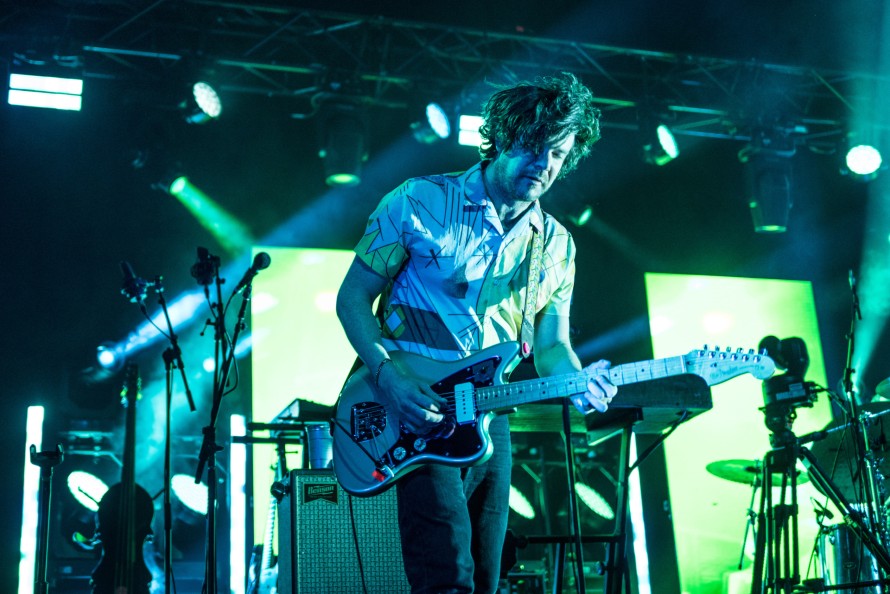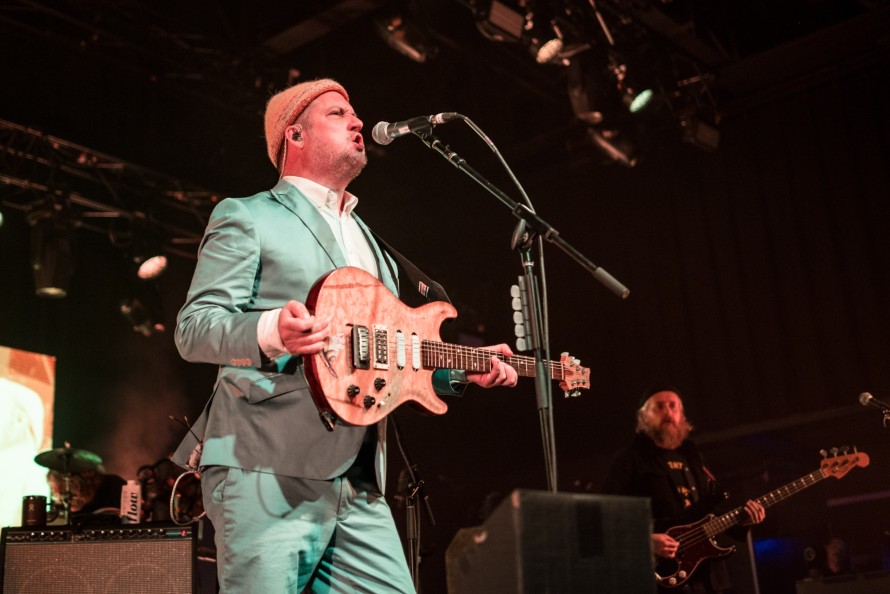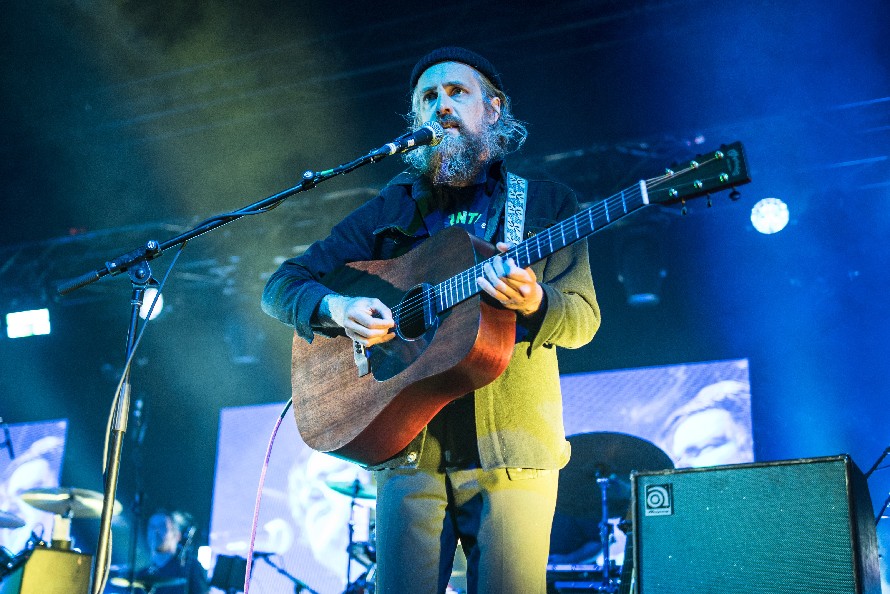Let's just get this out of the way right now: at their show last night at History, Modest Mouse played "Float On." It's usually a concert staple, although not guaranteed — last night, they kind of had to play it: the band, who are in their 31st year of existence, is currently touring in support of the 20th anniversary of their 2004 breakthrough album, Good News for People Who Love Bad News.
Although the band had, up until Good News…, been indie darlings, with three critically acclaimed and decent selling albums under their belt, Good News… pushed them into the indie rock stratosphere, selling millions of copies and receiving worldwide airplay.
While earlier albums, particularly their debut, showed off their Lync worship, Good News… clawed at the rock overground, the songs filled with humanity, wit and melody, even if some of them sounded like a junkyard falling down the stairs (a compliment, of course). Gone too were the glacial, anxious soundscapes of The Moon & Antarctica, or woozy, jittery road trips that populated The Lonesome Crowded West: In came triumphant horns, Waits-ian trashcan blues and steady rhythms!
Band leader Isaac Brock's afflicted psyche, while still present, gave way to bluesy introspection, all brass-heavy and boogie-worthy. While it isn't as cinematic or as frayed as some of those earlier releases, preferring — gasp! — chords and cohesion, Good News… saw Brock peering into himself and the salty ocean around him. He was still swimming against the current, but at least he had hope.

Although the band has seen its popularity wax and wane since the release of Good News…, Sunday's sold-out show proved that an old dog can rehash some of its old tricks, and people will still come out in droves to listen.
Openers Black Heart Procession must be the first band in history (and definitely at History) to come out on stage and start their set with a wailing singing saw. Their minimalist, three-piece set used light piano, simple, shimmering drum patterns, heavily reverbed vocal, and delay-drenched guitars to start the night off in a psychedelic-country-tinged haze. It was pulpy, melancholy and swoon-worthy, and more than a little repetitive. It harkened back to the Southern-fried garage rock of Compulsive Gamblers, with a decidedly Spaghetti Western vibe. There was lots of dark vibrato and atmospheric lighting, a bit moody compared to the upbeat set from Modest Mouse that followed. Still, there was some real tasteful overdrive and Pall Jenkins's voice was clean and powerful, if a bit overladen with effects. By the end it grew a bit wearisome, and the crowd chatter continued to increase as the set progressed, almost overtaking the band during the closing number. They received a worthy cheer at the end, but it was clear the crowd was ready to move on.
Right before Modest Mouse took the stage, the lights unexpectedly shot up super bright right before the black out, and the band, six-members strong, came out to a huge welcome as "Horn Intro" blared through the speakers. Brock, dressed in a powder blue suit and a yellow beanie, looked positively literary, a Flannery O'Connor character come to life — that is, if she wrote about Pacific Northwestern troubadours who venture to the South to learn the magic of the blues. At times he looked like he was performing an exorcism on himself.
Three large screens behind the band fractured and multiplied their image while a barrage of multicoloured cotton candy lights and panels flickered and danced. Set opener, the fragile "The World at Large," sparkled along until the band burst into an emotional, crashing outro… and this was just the first song!
Although the band was playing the album in full and in order, the audience treated each song like they didn't know what was coming next. Maybe they didn't, but it was still great to hear each one introduced by a righteous cheer from the crowd.

Live, the songs on Good News… betray a joyous reverence for community and connection. While it's not their best album, it's certainly their best known and most beloved work (at least in a mainstream sense). Although less complex, it's no less powerful, with Brock writing songs that he knew would elicit an exuberant response from his audience: the album features some of the bands most recognizable and chorus-worthy songs, including the "Ocean Breathes Salty," "The World at Large," "The Good Times Are Killing Me," and of course, "Float On," which has, since the album's release, become a staple at sporting events, festivals, indie dance nights and general group sing-alongs.
Surprisingly, the hits didn't even elicit some of the night's most rapturous responses. "Bury Me With It" brought out huge lights and big crowd energy, with people yelling along with Brock during the song's caustic, chaotic chorus.
A torrent of instruments flooded the stage as the set marched forward: a banjo, two drum sets with endless percussive elements, a euphonium, keyboards galore (including one that sounded like a pipe organ) and a bowed electric double bass. Brock switched up lyrics and inflections throughout the night, while the robust band filled the already-rich songs with energy and warmth. Most importantly, this wasn't just full-album cover band karaoke: although the band stayed faithful to the night's source material by employing as many of the album's elements as possible, they strove to reimagine the sound, not simply recreate it. The band clearly wasn't interested in just "doing" the album live; they wanted people to relive it in a new way, and it worked. You can hear the album any time: they wanted us to experience it, live through it, breathe it in.
"Dance Hall" and its infectious bounce saw pogoing and raised arms throughout the venue, while "Bukowski" was jittery and shambolic (as it should be), with Brock affixing his guitar pick to his sweaty forehead. Lead guitarist Simon O'Connor's background vocals were also on point, perfectly contrasting Brock's wail.
During "This Devil's Workday," Brock writhed with the mic liked a possessed preacher, while "The View" will always prove why Brock was the best choice to produce early Wolf Parade: that song is the Queen Mary, its sparkling dance punk complemented by floating blue and magenta lights, transporting us to a neon-fuelled party much more deserving of a Saturday night.
The slithery banjo intro of "Satin in a Coffin" received a huge response, and the crowd screamed along to its agitated cowpunk, while everyone obviously loved the frazzled, swear-heavy singalong of "Black Cadillacs."
Brock has always been an intense performer, attacking his guitar and himself in equal measure, but at last night's show he seemed relaxed, happy and personable. He was very funny, gracious even, telling stories and interacting with the crowd, while his cosmic, unflinching, and lisp-inflected caterwauling showed why he has one of the most recognizable voices in indie rock. After playing "Float On," he told a great story about making the song's video in Toronto (!) with two less band members due to "accidentally" forgotten passports. He's still not convinced it was an accident.

After playing the album, the band retreated for a short intermission, soundtracked by the I Dream of Jeannie theme song, "Baby Elephant Walk," and Horst Jankowski. When they returned, they were greeted with resounding cheers before settling into Act Two.
Surprisingly, the epilogue eschewed older material in favour of songs from the B-sides collection, No One's First, and You're Next. The band opened with the anthemic and criminally under-heard "Satellite Skin," a song with so much heart and power that it should have blown the roof off the joint, if only more people knew it. This was followed by the spacey, shrieking poly-vocal groove of "The Whale Song" and a strange jazzy interlude, which preceded the apocalyptic shanty, "King Rat"
For their last song, "Wooden Soldiers" off 2021's "return to form" The Golden Casket, they brought out a youth chamber choir made up of over two dozen black-clad singers. Brock told us how, during the rehearsals, he cried, for the first time, to a version of his own song. The singers swayed as Brock intoned, while a constant cricket click ran through the background. While it was a powerful and unexpected way to finish a Modest Mouse set, mournful and hypnotic and lacking any semblance of a gimmick, it also felt unnecessary, a wasted opportunity to play some pre-2004 material, as a nod to the pre-Good Times… aficionados. Alas, none came, and such is life.
Earlier in the night, during "Ocean Breathes Salty," Brock sang the existential line, "You wasted life / Why wouldn't you waste death." It's a heady phrase, both accusatory and resigned, but it also led to one of the night's loudest singalong moments, the crowd getting right behind every syllable. It stood out for one simple reason: with Good News for People Who Love Bad News, Modest Mouse proved they weren't going to waste a single second of life, even if it got bumpy. This tour is an affirming coronation, a reassessment and a much needed and well-deserved celebration of the album from both the audience and Modest Mouse themselves. Good news, indeed.
